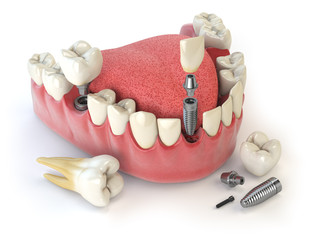Implants for Multiple Teeth
In the case of losing multiple adjacent teeth, the need to replace them becomes even more urgent, as it directly affects the quality of chewing, speech, and appearance.
Constructing a traditional bridge, when feasible, has the significant drawback of requiring the grinding down of adjacent teeth. This can lead to weakening and future deterioration of the healthy teeth that support the bridge.
Creating a partial denture places excessive forces on the neighboring teeth through the clasps that hold the denture in place. These forces can often lead to the loss of additional teeth. Additionally, partial dentures are often uncomfortable due to their bulk, reduced stability, and less aesthetic appearance compared to implant-supported restorations.
The most appropriate solution in this case is the placement of dental implants, upon which a fixed bridge can be supported. This method has the following advantages:
No grinding or weakening of the neighboring teeth is required.
Fixed bridges on implants offer high stability, avoiding the problems associated with partial dentures.
Implant-supported restorations are aesthetically superior and appear more natural compared to partial dentures.
Implants function like natural roots, stimulating the bone and preventing its recession.
